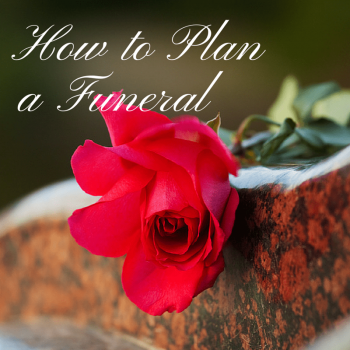How to Plan a Funeral

Written by Kristen Hicks
Even if you know death is coming for someone you love, it’s nearly impossible to be prepared when it happens. Not only are you struck with the grief of your loss, but suddenly there’s a list of obligations that must be attended to. Life doesn’t do us the courtesy of stopping when we have difficult emotions to face and with a death comes the need to plan a funeral.
In some cases, your loved one will have done much of the work for you. Many funeral homes offer pre-planning services for funerals, but even if they didn’t go that far, you may find clear instructions in their will or have heard your loved one go on at length about what they wanted before they passed.
In that case, some of the steps below will be taken care of and you can simply carry out the funeral plans that have already been made. If instead you find yourself in the position of planning a funeral from scratch, here are the main steps to keep in mind.
First: What To Do With the Body
You have many options here:
- You can have the body embalmed so that it’s suitable for an open casket.
- You can donate the body to science so your loved one’s death can give something back to society.
- You can have your loved one cremated so you can do something meaningful with the ashes. (Note: in some areas you may have the option of green cremation, a more environmentally friendly version of the practice.)
- You can choose a green burial where the body is lowered to the ground as is (without embalming), in either a biodegradable casket or shroud.
- You can opt for a burial at sea to honor your loved in the ocean they loved.
If your loved one never expressed a clear preference for any of these one way or another, you can either try to choose the option you feel would have the most meaning for them, or focus on which option has the most meaning for you and their other loved ones.
Don’t feel guilty also taking cost into consideration. It may seem crass talking about money after a death, but would your loved one really want you going into debt or dealing with stressful bills over their funeral?
Second: What Kind of Ceremony Would You Like
You have even more options here. You can get help from the funeral home of your choice or the religious community your loved one was a part of (if applicable) to work out the details of what a ceremony will look like.
Determine the preferred venue for your event and organize a schedule for how it will go – who will speak, if and when there will be a shared meal, if and when there’s a viewing, etc. This checklist from Everplans should help you figure out the details to consider.
Third: Who to Contact
You absolutely do not need to make a call to every person your loved one ever knew. This is actually a relatively easy step to check off your list. First, include the details of the funeral in the obituary printed in the local newspaper so all of your loved ones’ local contacts can find them there.
Next, think about all the primary organizations and communities your loved one was a part of. You can simply get in touch with one person from each and ask them to pass the information along to the rest. So one call to a friend from church, one to a former co-worker, one to the bridge club, etc. There are probably some overlaps in these communities, which will cut down on the amount of contact you need to make even more.
Fourth: Pay Your Respects and Mourn As You Need To
Wherever possible, feel free to let others take on some of the work of planning the funeral. People are often looking for any way to help after a death; so in letting them help you, you’re also helping them.
Be sure to find time in the midst of your plans for self-care. Don’t push off the mourning till later. Let yourself feel what you need to feel and cope in the way that works best for you. The funeral you plan will help you honor the memory of the person you loved, but it’s only one way to honor your loved one and work through your grief. Don’t neglect any of the other ways that work for you.
2 Comments
-
I’ve never had to plan a funeral before, but I suddenly find myself in the position of helping my friend plan her mother’s funeral. Her death was somewhat unexpected, so we’re scrambling a bit to figure out the services, which is difficult as my friend is trying to grieve. Do you have any suggestions on interfaith services? The family doesn’t all belong to the same denomination, and we want to be respectful to everyone.
-
I appreciate this information about how to plan a funeral. It is helpful to learn that one can have the body embalmed so that it is suitable for an open casket. I have also heard that one should find a funeral director who allows children if you are planning on having your kids and others attend.
